The fashion world is buzzing, and for good reason! “The Devil Wears Prada 2” is officially in production. Anne Hathaway, Meryl Streep, and Emily Blunt are back in their iconic roles, making our fashion-loving hearts race. With the release date set for May 1, 2026, one big question fans have is: How will the costumes showcase the dramatic changes in fashion from 2006 to the digital-focused landscape of 2026?
The original film came out in 2006 and captured the essence of early 2000s high fashion. It featured skinny scarves, statement belts, Juicy Couture tracksuits (even if we didn’t see Miranda in one), and an early awareness of digital media’s effects on the industry. Fast forward to now, and the fashion scene has changed completely. This is where “DWP2″‘s costume design will truly dazzle.

Photo credit: W Magazine
 The Fashion World Is Watching, Again
The Fashion World Is Watching, Again
Nearly two decades after it first graced our screens, The Devil Wears Prada is still one of the most memorable fashion films ever made. In 2006, it provided a sharp look into the intersection of high fashion and media power. Now, The Devil Wears Prada 2, set for release in 2026, aims to do the same. This time, the film reflects an industry reshaped by digital disruption, AI, sustainability, and the rapid rise of social media.
While the original film’s strength relied heavily on its story and unforgettable performances, it was the costume design led by Patricia Field that gave the film its lasting impact. In the sequel, Oscar-winning costume designer Jacqueline Durran takes over, mixing timeless elegance with a futuristic touch.
This deep dive looks at the significant changes in costume design, comparing the finely tailored fashion of 2006 to the bold, digital-first style of 2026.
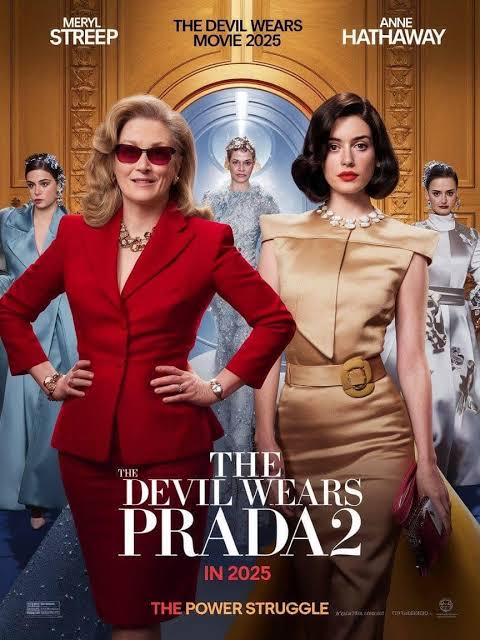
Photo credit: Facebook
 2006: Defining the Fashion Film Aesthetic
2006: Defining the Fashion Film Aesthetic
Let’s turn back the clock to 2006. The fashion scene was very different back then. Instagram wasn’t a thing yet, and magazines like Runway (standing in for Vogue) still had cultural clout. A young Andy Sachs entered a world filled with chiffon scarves, six-inch stilettos, and designer tote bags.
Patricia Field’s styling set the stage for the fashion of the 2000s:
Crisp tailoring from Chanel, Calvin Klein, and Donna Karan
Logo-heavy accessories (remember that iconic Chanel necklace?)
Thigh-high boots, fitted turtlenecks, and waist-cinching belts
Bold editorial colors contrasted with monochromatic power looks
Miranda Priestly (Meryl Streep) became a symbol of minimalist sophistication with her silver-white bob, icy glare, and sharply tailored jackets, reshaping how female power was portrayed in fashion. Andy (Anne Hathaway) underwent a visual journey that reflected her personal growth, transforming from oversized sweaters to chic, fashion-forward outfits.
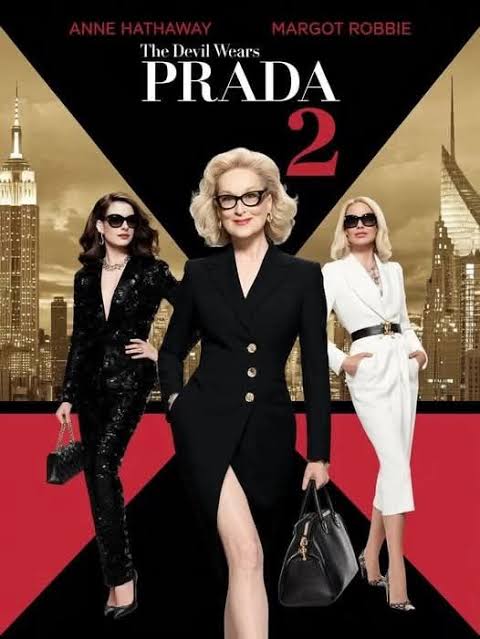
Photo credit: Instagram
 2026: Reimagining Fashion in a Digital World
2026: Reimagining Fashion in a Digital World
The sequel is more than just a follow-up; it’s a commentary on how quickly fashion has evolved. The Devil Wears Prada 2 shows a world where clothing means more than just fabric—it now incorporates data, ethics, and digital identity.
Jacqueline Durran’s vision embraces this change, creating a visual language that reflects fashion’s history, present, and future.
Key Costume Themes in the Sequel:
1. Digital Couture & AI-Driven Design: In 2026, design goes beyond simple sketching and sewing. Many costumes in the film are reportedly designed in partnership with AI fashion platforms, using algorithms to create textiles and patterns unseen by human designers.
Expect to see: Clothing with built-in microchips that show programmable messages
Virtual layering using AR lenses—a nod to fashion in the metaverse
Collaborations with brands like The Fabricant, Auroboros, and Iris van Herpen, known for 3D-printed fashion
Miranda’s wardrobe features statement coats with interactive surfaces that subtly glow, thanks to embedded light-responsive threads, where power dressing meets soft technology.
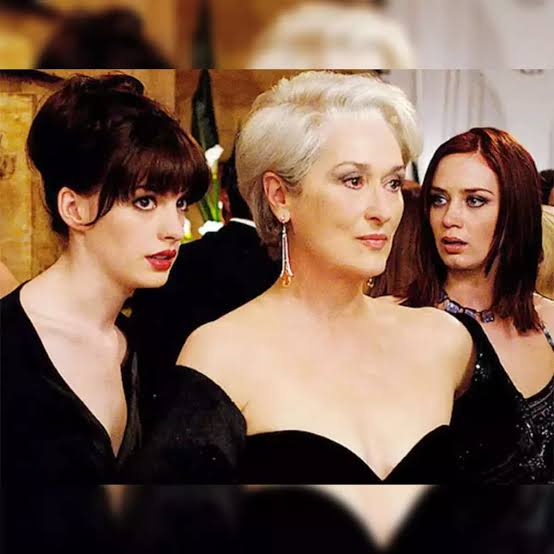
Photo credit: The Economic Times
2. Eco-Luxury & Conscious Glamour: Fashion in 2026 puts a strong focus on sustainability. Miranda’s outfits emphasize slow fashion, while new characters advocate for circular fashion, using upcycled pieces and plant-based leather alternatives.
Key examples include:
Mushroom leather coats (Mylo) by Stella McCartney
Regenerated cashmere suits from Loro Piana
Naturally dyed silks in earthy tones, balancing the digital flash
Rather than flashy logos, garments now feature ethical sourcing labels, with QR codes showing full supply chain transparency.
3. Gender Fluidity in Style: Emily Charlton (Emily Blunt), now a fashion powerhouse, has moved beyond her assistant role. She embraces tailored skirtsuits, wide-leg pants, and architectural outerwear with confidence.
Her wardrobe includes:
Pieces from Willy Chavarria, Grace Wales Bonner, and Thom Browne
Layered silhouettes defying traditional gender norms
Footwear from bold brands like Rombaut and Eytys
In 2026, power comes not from strict looks but from fluid self-expression, and Emily showcases this effortlessly.
4. The Rise of the Digital Native: A key character in the sequel is a Gen Z fashion influencer, likely Andy’s daughter. As a rising digital tastemaker, her wardrobe captures the fashion-meets-technology moment.
Her outfits mix:
Digital fashion layers are visible only through AR glasses
Y2K nostalgia meeting techwear (consider Coperni, Heaven by Marc Jacobs, and Diesel’s digital denim)
Upcycled designer pieces paired with futuristic styles
She bridges the gap between Miranda’s analog background and today’s digital-first fashion world.
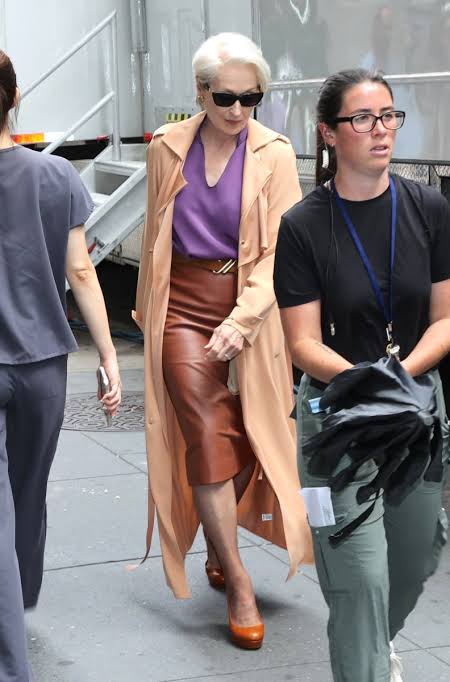
Photo credit: Deadline
 The Return of Miranda Priestly: Fashion’s Eternal Force
The Return of Miranda Priestly: Fashion’s Eternal Force
Miranda Priestly remains the center of the Prada universe. Though older, her style command is as sharp as ever, now combined with a deep understanding of technology and cultural relevance.
Her fresh look includes:
Color palette: reflective silver, bright white, gunmetal gray, and deep black
Texture over print: 3D-printed scales, nanotech fabrics, and sustainable sequins
Accessories: Smart jewelry that doubles as communication devices and voice-activated bags from Telfar Labs
Even with the evolving fashion landscape, Miranda’s presence continues to capture attention and impact global fashion. She’s not just the editor-in-chief of Runway but also a style oracle who embraces change on her own terms.
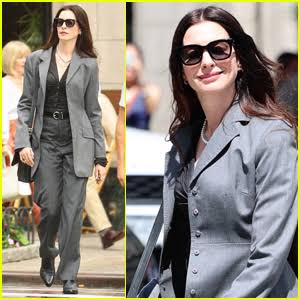
Photo credit: Just Jared
 Emily Charlton: The Evolution of Edge
Emily Charlton: The Evolution of Edge
Emily’s story is one of growth. Her former high-strung, loyalty-driven self has transformed into a composed, visionary leader of her own fashion division. She dresses to make an impression and provoke thought.
Look out for:
Bold prints from Marine Serre and Luar
Asymmetrical tailoring by Y/Project
Sustainable sneakers paired with couture jackets, challenging traditional norms
Emily’s fashion narrative honors her past while reflecting the future: a move toward personality-driven power.
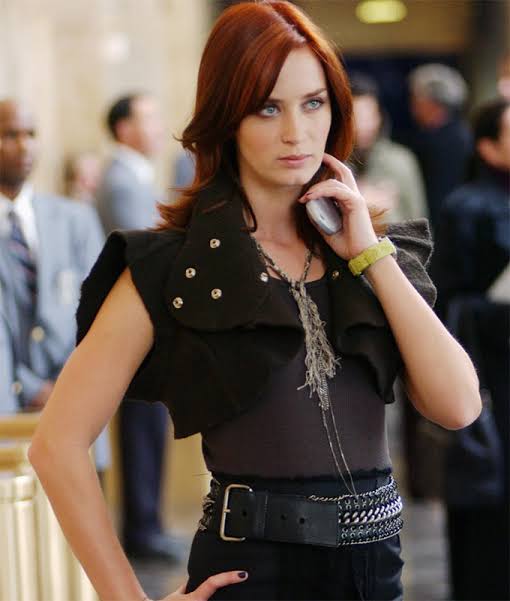
Photo credit: PureWow
 Costume Design as Cultural Commentary
Costume Design as Cultural Commentary
The real brilliance of The Devil Wears Prada 2 lies not only in its characters or couture but in how clothing conveys a larger message. Jacqueline Durran uses costume design to illustrate how fashion now serves as:
A technological link
A sustainability statement
A gender-neutral dialogue
A form of digital identity
The costumes in the sequel don’t just outfit characters; they comment on algorithms replacing editors, influencers taking center stage, and AR changing the fitting room experience.
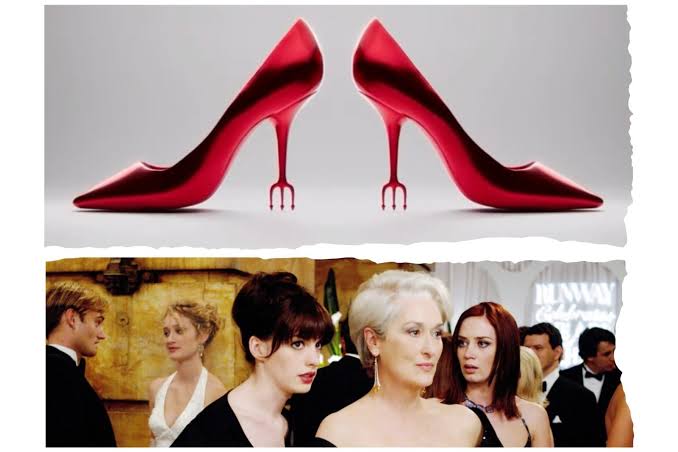
Photo credit: Phrasemaker
 The New Style Language: From Power to Personal
The New Style Language: From Power to Personal
In 2006, fashion emphasized exclusivity, perfection, and aspiration. By 2026, it focuses on authenticity, innovation, and expression.
While the original film highlighted conformity to high fashion, the sequel celebrates variety. No two characters dress alike, and that’s intentional. Everyone wears who they truly are—digitally, ethically, and emotionally.
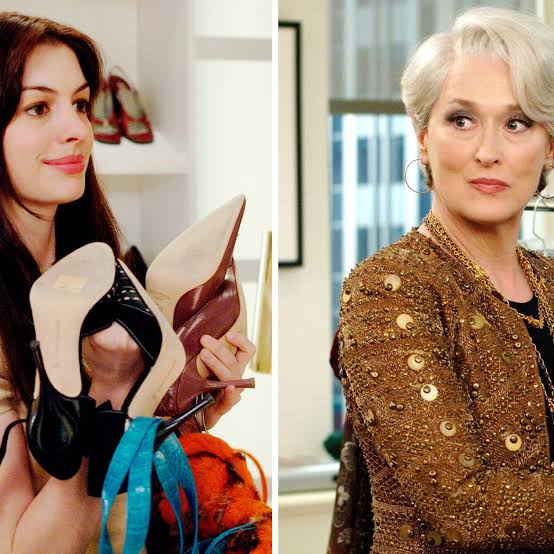
Photo credit: Heart Radio
 Final Thoughts: The Runway Never Ends
Final Thoughts: The Runway Never Ends
The Devil Wears Prada 2 isn’t just another sequel—it’s a fashion statement for a new era. While much has changed—our screens, our values, our wardrobes—one thing remains constant: fashion’s ability to define, challenge, and amaze.
Whether it’s Miranda in shimmering armor or a Gen Z icon in glitchcore glam, the film reminds us that style evolves but never disappears. In a fast-paced world filled with spectacle, the right look still demands attention—and Miranda Priestly always knows what that look is.
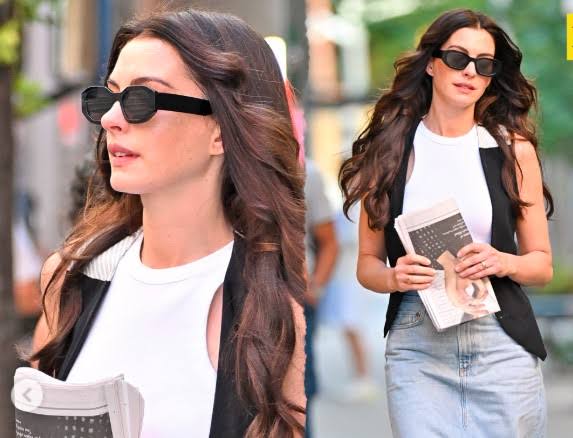
Photo credit: HOLR Magazine
 Blog Author: RAJA BAHAR KHAN SOOMRO
Blog Author: RAJA BAHAR KHAN SOOMRO

Top 10 Affordable Men’s and Women’s Footwear Brands for Stylish, Budget-Friendly Looks 2025
Mode in France Tokyo: French Ready‑To‑Wear & Accessories for SS 2026 in the Heart of Shibuya
Top 10 Affordable Makeup Brands in 2025: Budget-Friendly, Reliable, and High-Quality
Recommend0 recommendationsPublished in apparel, celebrity fashion, Jewelry, Makeup, Our Fashion Passion, Petite, Plus Size, Pop Fashion, Shoes, street style, Uncategorized

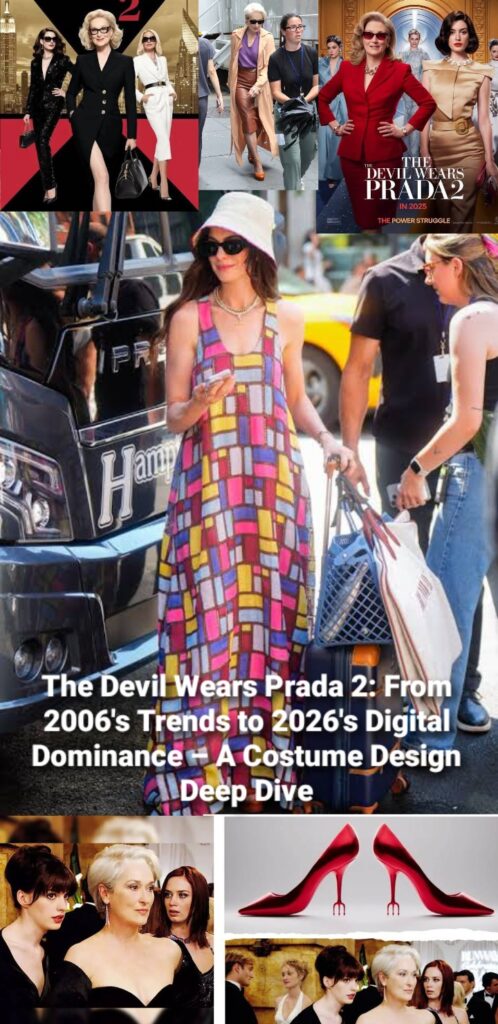
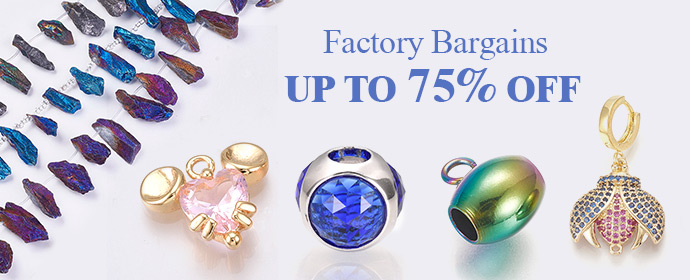
 The Fashion World Is Watching, Again
The Fashion World Is Watching, Again
 2006: Defining the Fashion Film Aesthetic
2006: Defining the Fashion Film Aesthetic
 2026: Reimagining Fashion in a Digital World
2026: Reimagining Fashion in a Digital World
 The Return of Miranda Priestly: Fashion’s Eternal Force
The Return of Miranda Priestly: Fashion’s Eternal Force
 Emily Charlton: The Evolution of Edge
Emily Charlton: The Evolution of Edge Costume Design as Cultural Commentary
Costume Design as Cultural Commentary
 The New Style Language: From Power to Personal
The New Style Language: From Power to Personal Final Thoughts: The Runway Never Ends
Final Thoughts: The Runway Never Ends Blog Author:
Blog Author: 